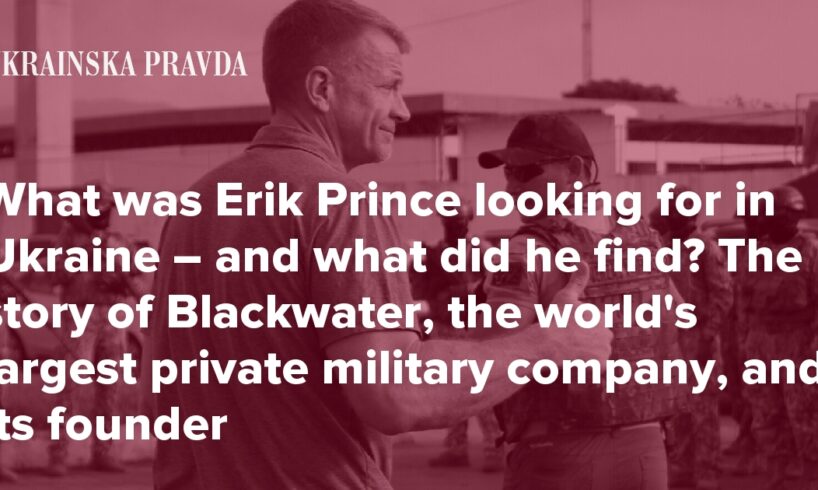
Amid reports that US President Donald Trump has suggested deploying American private military companies to Ukraine as part of security guarantees, the founder of the most famous of these companies – Blackwater – has shown renewed interest in Ukrainian drones. Who is he, and what is he looking for in Ukraine?
Private military companies are an integral tool in modern warfare. For many Ukrainians, the acronym “PMC” is primarily associated with the Wagner Group, the Russian company that was linked to Yevgeny Prigozhin, a close ally of Russian leader Vladimir Putin.
There are many other PMCs around the world, but the largest is thought to be Blackwater. It was founded by Erik Prince, a former US Navy officer who is now part of the MAGA (Make America Great Again) movement, a backer of Trump’s presidential campaigns and one of his key informal advisers. Prince is also reported to have the ear of US National Intelligence Director Tulsi Gabbard.
Starting with the two administrations of George W. Bush, Blackwater was a major beneficiary of Pentagon spending on the wars in Iraq and Afghanistan. But a mass killing of civilians in Baghdad by Blackwater contractors led to prison sentences, congressional investigations and the company being blacklisted. Years later, Trump pardoned all the contractors involved in the shooting.
Advertisement:
Prince has sought to leverage his closeness to Trump for his own purposes. During Trump’s first term, he was in talks with Andrii Yermak, Head of the President’s Office, about buying the Ukrainian aerospace company Motor Sich and creating a US$10 billion consortium in Ukraine. Those plans never materialised due to Trump’s defeat in the 2020 presidential election.
Since Trump’s return to the White House, Prince has become active again. He is seeking a contract to assist in the mass deportation of migrants from the US and has stirred up discussions about a possible US war with oil-rich Venezuela. He has once more shown interest in Ukraine, exploring the possibility of acquiring drone manufacturers – likely with the White House’s approval.
Prince has been described as “a Bond villain”, “an opportunist” and “the most famous mercenary of modern times”. How did he build one of the world’s most famous PMCs, and why did he sell it? What links Ukraine and Haiti as objects of Prince’s interest, and why was he unable to buy Motor Sich?
How Blackwater emerged
Erik Prince was born in 1969 into a wealthy family. His father, Edgar D. Prince, was the founder of Prince Manufacturing Corporation, a manufacturer of car parts. The company became a key supplier to the American automobile industry. Prince’s father invested part of his profits in other types of car components and shopping malls, gradually building a network of companies and real estate valued at over US$1 billion.
Prince often travelled with his parents. A particularly formative trip to Europe, when his father took him to the Dachau concentration camp, the Berlin Wall, and the site of the Allied landing in Normandy, left a strong impression on him. Erik aspired to a career in the military. He enrolled in the United States Naval Academy but spent only three semesters there, later explaining that while he loved the Navy, he did not like the Academy.
Advertisement:
Prince continued his education at college. While studying economics, he worked as a firefighter and emergency medical technician. After graduating from college and Officer Candidate School, he became a US Navy SEAL at the age of 23. During his service with SEAL Team 8, he deployed to Haiti, the Middle East and the Balkans. Prince later wrote that his experiences in Yugoslavia opened his eyes to the need for private training facilities for special operations.
When his father passed away in 1995, Prince inherited substantial wealth. He left active military service prematurely and, together with instructor Al Clark, established a private training centre. Prince was the main investor, purchasing 24 sq km of land near the Great Dismal Swamp in North Carolina for US$6 million. The location inspired the company’s name – Blackwater.
The centre soon developed its first major training ground, featuring shooting ranges, sports simulators, and dozens of tactical sites designed to mimic different combat environments, from villages to urban squares with burnt-out cars. Initially the base made a loss, but eventually it began to attract up to 30,000 visitors a year.
Within two years Blackwater expanded from a local to a national operation. In 2000, the USS Cole was bombed off the coast of Yemen. At the time, Blackwater already maintained a permanent contingent, which later became the core of the PMC. Most of its members were former Navy SEALs, Marines or Green Berets. Blackwater secured a US$35 million contract to train naval personnel.
The Blackwater Training Centre in North Carolina.
Photo: AP
Another turning point came with the terrorist attacks of 11 September 2001. The US government dramatically increased its investment in security and military training, leading to a surge in contracts for Prince’s company.
Initially, Blackwater’s work involved training personnel and patrolling streets, but it soon expanded to escorting high-value shipments and delegations and providing security for the CIA.
The high point of the PMC era
As the complexity of its missions increased, so too did the fees. Before long, Blackwater became one of the US State Department’s main contractors. The company provided security for American diplomats in Iraq and Afghanistan, delivered supplies to front lines, trained both mercenaries and regular soldiers, and conducted covert missions for the CIA.
Blackwater quickly became a key US State Department contractor.
Photo: Getty Images
In 2000, Prince’s company secured US$200,000 in government contracts, but within just a few years that figure had risen to US$1 billion. Over $800 million of this came from two major State Department contracts (2004-2006) to provide diplomatic protection in Iraq.
It was during this period that Blackwater effectively became a private army. Its duties expanded beyond protection and logistics to direct participation in combat operations, particularly in Afghanistan and Iraq. It controlled tens of thousands of employees, hundreds of vehicles, its own fleet of aircraft, and heavily armed units.
Blackwater mercenaries in Afghanistan.
Photo: AP
This transformation is regarded as the peak of Blackwater’s development and a symbol of the private military company era. Prince’s company was seen at the time as almost indispensable to both the Pentagon and the State Department. Blackwater even established a research and engineering division to develop its own weapons and vehicles, including a 14-tonne armoured car known as the Grizzly.
Blackwater’s importance was further demonstrated in 2005 when its contractors were deployed to deal with the devastating aftermath of Hurricane Katrina. They delivered food and water to survivors and evacuated the injured. Meanwhile, however, Blackwater had become the focus of investigative journalism amid allegations of arms smuggling and abuses of power. Evidence also emerged of the massacre of civilians in Iraq.
Advertisement:
A reputation-destroying scandal and change of ownership
The real challenge for Blackwater came in 2007. On 16 September, a convoy of the company’s armoured vehicles, which were escorting US State Department officials in Baghdad, opened fire on civilians. Seventeen people were killed and 20 injured.
There were initial claims that the shooting began in response to the movement of a suspected car bomb, but later evidence confirmed that one of the fighters kept firing even after his colleagues urged him to stop. He only stopped when another fighter aimed his own weapon at him. Three others who witnessed the incident said they had seen no justification for the shooting.
An international scandal erupted, sparking investigations and court cases. The company’s licence to operate in Iraq was suspended, costing it tens of millions of dollars. Four contractors were sentenced to lengthy prison terms (they were pardoned by Donald Trump in 2020). The massacre became a symbol of the dangers posed by largely unregulated private armies and raised questions about their very legitimacy.
PMC mercenaries on the roof of a house in Baghdad, 2007.
Photo: Getty Images
The criticism of Blackwater continued after Barack Obama was elected US president. Erik Prince argued in his defence that much of this criticism was politically motivated: he had held right-wing views from a young age, described himself as a conservative Christian, and later became a close ally of Trump. Prince also lobbied for private contractors to be used in large-scale deportations of migrants, setting his sights on a US$25 billion contract.
Erik Prince testifies about private security contracts in Iraq and Afghanistan at a hearing on Capitol Hill, 2 October 2007
Photo: Getty Images
There were also lawsuits from Iraqi civilians who accused Blackwater of killing or injuring their relatives. In an effort to salvage the company’s image, Prince stepped down as CEO in 2009, and 18 months later he sold the company to a group of investors. The firm was renamed Xe Services LLC, and two years later it was rebranded again as Academi, with new management and promises of a “fresh start”.
In 2014, Academi merged with the major security company Triple Canopy to form the Constellis Group. Blackwater had ceased to exist as a separate entity.
After the merger with Triple Canopy, Blackwater ceased to exist as a separate entity.
Photo: Constellis
Cooperation with China
After the scandals in Iraq, Prince distanced himself from Blackwater. Having sold the PMC, he invested in technology startups and founded Frontier Services Group (FSG) in Hong Kong. FSG provided security and logistics in high-risk regions, mainly in Africa, often in conjunction with Chinese government bodies.
After selling Blackwater, Prince cooperated with the Chinese, which damaged his reputation on the market
Photo Getty Images
In 2019, FSG announced the establishment of a “training camp” (a de facto mercenary company with former Chinese army soldiers) in Xinjiang, where Muslim Uyghurs suffer severe repressions from the local security forces.
This was damaging for Prince’s reputation on the PMC market in the US. He was forced to justify himself, saying that he was only a minority shareholder in FSG (the majority shareholder being the Chinese state investment fund CITIC Group) and claiming he knew nothing about the company’s activities in Xinjiang. In 2021, Prince left the company.
Trump adviser and attempt to enter Ukraine
After the war started in Ukraine’s east in 2014, reports began to appear in foreign media that Academi fighters were involved in the Anti-Terrorist Operation (ATO). The company denied this.
Prince was one of Trump’s backers and MAGA allies during his first term. At that time, his sister Betsy DeVos headed the US Department of Education. With his experience in security, Erik became an informal adviser to Trump, which included conducting negotiations on the purchase of Motor Sich. At the time, there was an ongoing saga over the potential sale of shares in the company to Chinese investors, and the White House was seeking to block the deal.
Prince visited Ukraine and had discussions with local officials regarding Motor Sich. Eventually, under US pressure, Ukraine blocked the sale of the shares to the Chinese investors, and after the start of the full-scale war, the plant was nationalised.
Prince was an informal adviser to Trump during his first term and sought to purchase the Motor Sich and Antonov plants.
Photo: Getty Images
Why did Prince fail to buy Motor Sich? In 2021, TIME reported that the American’s ambitions were not limited to the plant in Zaporizhzhia. He wanted to take control of the Antonov aircraft manufacturing plant, create a vertically integrated holding company, attract US$10 billion worth of investments and contracts, and become a competitor to Boeing and Airbus.
Prince also planned to build a munitions factory and create a private army of ATO veterans modelled on Blackwater. To this end he met with Ukrainian officials, including Ihor Novikov, then an adviser to President Volodymyr Zelenskyy, and Andrii Yermak, Head of the President’s Office, in 2020. Ekonomichna Pravda sent inquiries to Prince and the President’s Office regarding the details of these meetings, but at the time of publication no response has been received.
“Had it been another four years of Trump, Erik would probably be closing the deal,” Novikov said at the time. But things turned out differently: the 2020 US elections were won by Joe Biden.
There were concerns in Kyiv that Prince had been in contact with former MPs Andrii Artemenko and Andrii Derkach. Washington had included Derkach in its list of Russian agents. Both had been involved in the investigation into Russian interference in the US elections. Derkach fled Ukraine and joined the Security and Defence Committee of Russia’s Federation Council.
How Prince got interested in drones
Amid reports that Trump is considering using American PMCs as part of Ukraine’s post-war security guarantees, Prince is seeking to acquire Ukrainian drone manufacturing companies through his new company Vectus Global. He has been pursuing meetings with leading industry players, aggressively promoting his services.
Read also: Billionaire and ex-Google CEO Eric Schmidt is making drones for Ukraine. What drives him?
Sources say Prince’s attempts to acquire Ukrainian drone manufacturers have so far been unsuccessful, since such companies are a strategic asset for Ukraine and Prince has a questionable reputation after working with China. This has made him “unacceptable” from an intelligence perspective. “Prince has a bad reputation generally in the industry. No clean person will hire him,” admitted the head of an international drone manufacturing company.
Experts believe that with his interest in Ukrainian UAVs, Prince is seeking to replicate his business model as an “opportunistic Pentagon contractor with close ties to Trump and a history of making large profits from foreign wars”.
“I’m not surprised at all,” said a former US special forces operative who has worked in Ukraine. “Drones are now an integral part of the PMC world. If you’re a PMC and you don’t have a drone or possibly an electronic warfare capability, you are antiquated.”
The glory days of Blackwater’s business model during the wars in Iraq and Afghanistan are long gone, so it is not surprising that Prince is actively looking for new opportunities. In May 2025 the government of Ecuador engaged him as a strategic adviser in its “war” on crime. Prince’s company has been authorised to fight narco-terrorism, piracy, and illegal fishing in the Pacific Ocean.
Erik Prince in Ecuador, where his company will be fighting crime
Photo: Getty Images
Prince’s interest in drones in Ukraine comes after his firm Vectus Global secured a ten-year deal in Haiti to combat the armed gangs that control a large part of the capital. The firm recruits mercenaries, deploys drones, helicopters and boats, trains local security forces and, when the situation has been stabilised, will help rebuild the tax system.
Advertisement:
Their programme to deploy drones against gangs, for which Prince is a key adviser, sparked considerable debate after police officers were killed during one such operation. The mercenaries have been criticised for failing to coordinate with the Haitian police.
The Blackwater founder’s foray into Haiti with Vectus Global was no accident. Western mining companies’ interests are concentrated there. Prince wanted to run a similar scheme in Afghanistan in 2018, proposing to fund mercenaries with money from local mining projects.
“[Prince] is going places where there are minerals and the US wants to create joint sovereign wealth funds. Ukraine fits that,” said Morgan Lerrette, a former Blackwater contractor in Iraq, referring to the minerals deal between Ukraine and the US.
Ekonomichna Pravda contacted Prince with questions about his interest in drones in Ukraine, but had received no response by the time of publication.
Prince wants to acquire Ukrainian drone manufacturers
Photo: Ministry of Defence of Ukraine
Prince may be acting with US government backing. The Pentagon is interested in partnering with American drone manufacturers that are present in Ukraine in order to understand how the next major conflict will be fought and what soldiers will need.
US Defense Secretary Pete Hegseth announced in July that he was “unleashing US military drones dominance”, and Zelenskyy has said that Ukraine is preparing an agreement with the US on purchasing American weapons in exchange for selling Ukrainian drones.
Advertisement:
“Secure” smartphones that raise many questions
Another of Prince’s projects is Unplugged, a company which is developing a “privacy-first” smartphone, the UP Phone. The company announced it in 2022, but it only went on sale in 2024. Unplugged has not disclosed how many smartphones have been sold, claiming that they “sold out within a few hours”.
In August 2025, the company announced the relaunch of the UP Phone. According to The Verge, the hardware remained almost identical: a MediaTek Dimensity 1200 processor, a 6.67-inch OLED display, 8 GB of RAM, and a triple rear camera with a main 108-megapixel lens.
The price also remained unchanged at US$989. This includes the first year of subscription to Unplugged’s privacy service, which thereafter costs US$12.99 per month and includes a VPN, antivirus protection, encrypted messaging and cloud photo storage.
The company states that the smartphone runs on the Unplugged OS operating system, which has been specially designed for privacy and functions independently of Big Tech ecosystems to prevent tracking and data harvesting. According to Unplugged, the new UP Phone uses open-source Android without Google Mobile Services (GMS), which “prevents data collection”.
The smartphone is equipped with a set of privacy-oriented features: a built-in firewall, a VPN that does not record or store internet activity, and a special Privacy Center app for data management.
Another feature is the Battery Disconnect Switch, which the company says blocks tracking and data harvesting. These functions were also available in the first UP Phone, but Unplugged claims the operating system has been significantly updated and improved.
Prince’s company produces “privacy-first” smartphones, but there are many questions about the “uniqueness” it claims
Photo: Unplugged
The smartphones are assembled in Indonesia. The company promises that they will be manufactured in the US, but components will be sourced from abroad. The UP Phone is only available in the US and Canada.
When presenting the first UP Phone, Unplugged promised impenetrability and message security comparable to government-grade protection. However, market experts assessed these marketing claims as “exaggerated”, and the company abandoned these bold assertions.
Advertisement:
American social media is filled with criticism of the UP Phone and doubts about the security it claims to provide, while the developers of the GrapheneOS operating system called the first version of the smartphone “a clear-cut scam”.
Critics say that Unplugged relies on the product being promoted among conservative Americans through political connections and podcast partnerships rather than on its substance. “It’s a blatant scam and they’re completely ripping those people off while putting them at risk. Their devices lack basic defences against data extraction and exploitation. They’re far worse than using an iPhone,” insist the GrapheneOS developers.
Prince does indeed promote the UP Phone in every episode of his podcast, Off Leash. He has claimed that the smartphone would have prevented the mass killings during Hamas’s attack on Israel in 2023, arguing that phone data had been the source of Hamas’s intelligence. “Our smartphone would have prevented this,” Prince asserted.
Data privacy experts are sceptical of such claims, as the functions Prince promotes can be enabled on most smartphones and advertising IDs can be deactivated on both Android and iPhone.
Author: Oleksii Pavlysh
Translation: Tetiana Buchkovska, Anastasiia Yankina
Editing: Teresa Pearce





